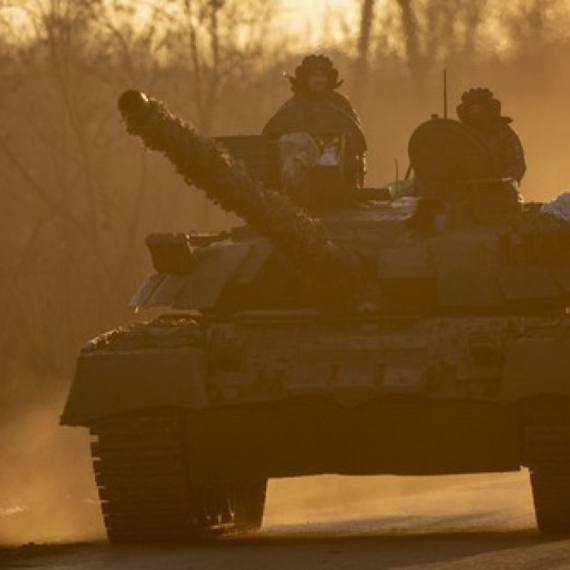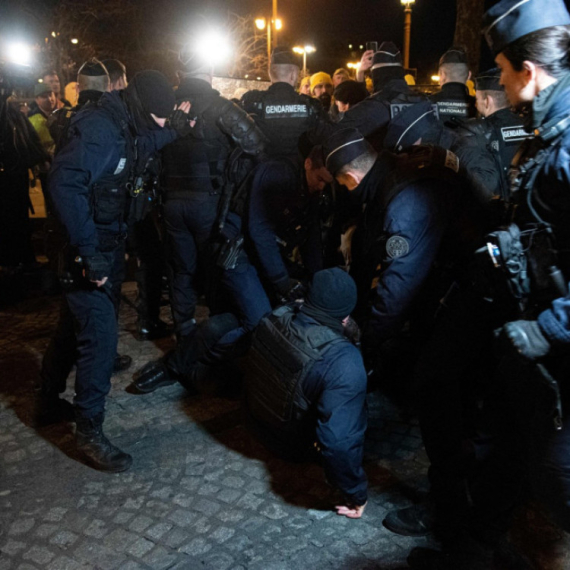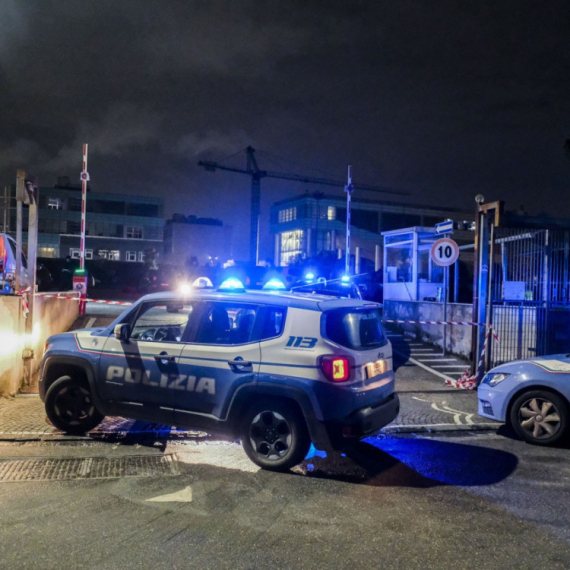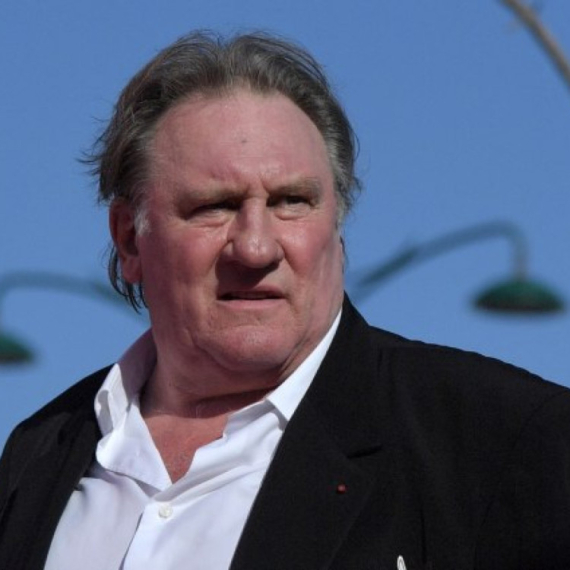Defense calls for Šainović’s acquittal
Ex-Yugoslav PM Nikola Šainović’s defense team has called on the Hague to acquit their client of war crimes in Kosovo.
Thursday, 21.08.2008.
09:46

Ex-Yugoslav PM Nikola Sainovic’s defense team has called on the Hague to acquit their client of war crimes in Kosovo. Sainovic is accused of the forced displacement, deportation, murder and persecution of Albanian civilians in Kosovo during the first six months of 1999. Defense calls for Sainovic’s acquittal Known as the Kosovo Six, Sainovic, former Serbian President Milan Milutinovic, Head of the Yugoslav Army’s (VJ) Chief of Staff Dragoljub Ojdanic, VJ Third Army Commander Nebojsa Pavkovic, VJ Pristina Corps Commander Vladimir Lazarevic, and Serbian MUP Chief of Staff in Kosovo Sreten Lukic stand accused of committing war crimes in Kosovo during 1999. Sainovic’s defense counsel Toma Fila said that the level of evidence presented during the trail, which began in 2006, had been “very low,” and that the indictment was based on “suspicions without any good evidence.” Fila said that the prosecution had been unable to prove that there had been a “joint command” in Kosovo for the Yugoslav Army and the Serbian Interior Ministry, nor that Sainovic had been a member of that command, “much less the commander.” According to the indictment, this “command”, in which Pavkovic and Lukic were accused of participating, worked on displacing Albanians from Kosovo, which was the goal of the “criminal undertaking” conceived by then President Slobodan Milosevic. Fila said that it was more of a “coordination of police and military” which is “normal in war,” and that the term “joint command” had been used at General Pavkovic’s proposal in unofficial communication between people who discussed these matters. The lawyer added that Sainovic had acted in Kosovo exclusively as the deputy prime minister and the chief of the commission for relations with the OSCE mission, in accordance with government decisions and laws. According to the defense, the former prime minister asked for all alleged war crimes to be investigated and suitably sanctioned, and that all agreements with the international community should be honored. Fila said that even international officials called by the prosecution, like Wolfgang Petritsch, had confirmed that Sainovic “fought for peace” all the way through the Rambouillet Conference. "What was he to do later? Kill himself?” Sainovic’s lawyer wondered. The defense counsel underlined that the prosecution in their closing argument had said for the first time that Sainovic had “political supervision” over state forces in Kosovo, even though the indictment cited that he had “commanded” both the army and the police. "The Federal Republic of Yugoslavia, however it may have seemed, was a country at the time, and in every country, security forces are supervised by the government. The Yugoslav Army [VJ] was under the jurisdiction of the federal government, while the Serbian Interior Ministry [MUP] was under the jurisdiction of the Serbian government and the interior minister” Fila said. He dismissed claims that Sainovic had been Milosevic’s “political right hand man,” insisting that the two of them had only met once during 1999. Refuting the prosecution’s claims that the main objective of the “criminal undertaking” had been to change the ethnic structure of Kosovo by persecuting ethnic Albanians, Fila suggested that the permanent expulsion of 800,000 ethnic Albanians would be impossible. Sainovic’s lawyer said that the United States had wanted to start a bombing campaign against the Federal Republic of Yugoslavia and Serbia, illustrating it with defense witness testimony that Bill Clinton had admitted to a delegation of Serbs living in the U.S. that during the Rambouillet Conference, the Serbian delegation had been set demands that were unacceptable. Fila called the prosecution’s claim that the defendants’ major objective had been to secure lasting Serbian control over Kosovo by changing its ethnic balance, as a “sad simplification of historical events.” "The control of your country’s territory is not a criminal intent, but a constitutional obligation,” he said, adding that Security Council Resolution 1244, which ended the war in Kosovo in June 1999, stated that Kosovo was a part of Serbia. The defense’s closing statement will continue. The prosecution called on all the defendants to be found guilty and sentenced to prison terms ranging from 20 years to life. Prosecution demands 20 to life for Kosovo Six Hague Prosecutors have asked for prison terms of 20 years to life in prison for the Kosovo Six. In its closing statement, the prosecution asked the trial chamber for prison sentences of between 20 years and life, if found guilty, for the six former Serbian political and military officials, Milan Milutinovic, Nikola Sainovic, Dragoljub Ojdanic, Nebojsa Pavkovic, Vladimir Lazarevic and Sreten Lukic. The prosecution said that during the trial, which started in 2006, it had proven that the six suspects had participated in a “united criminal undertaking” with the goal of “changing the ethnic balance in Kosovo in order to secure lasting Serbian control” over the province. The prosecution claimed that it had been proven that various Serbian forces, including the Yugoslav Army and the Serbian Interior Ministry, had forced out about 800,000 Albanians, killed thousands of civilians, sexually abused women and destroyed and pillaged property and religious buildings in Kosovo. Prosecutor Tom Hannis said that despite the fact that there was no direct or key proof – such as a plan for displacing Albanians or confessions from one of the accused – the material evidence of the crimes in Kosovo confirmed the claims of the indictment that there had been a “criminal undertaking” and that Albanian civilians had been removed from the province in “a significant number.” Hannis claimed that the NATO bombing in March 1999 had enabled the accused to carry out their plan in relative secrecy, but that the plan to remove Albanians from Kosovo had been created in the spring of 1998 by Slobodan Milosevic, and would have been carried out regardless of the NATO bombing campaign. He said that the evidence for that claim was that Serb officials at the Rambouillet and Paris talks in 1999, “were not willing to discuss a peaceful solution in good faith.” Speaking of the role of one of the accused, General Nebojsa Pavkovic, Hannis suggested that he was a key officer of the army through whom Milosevic, with the mediation of Nikola Sainovic as the chief of the “united command” of the military and police in Pristina, controlled the operation in Kosovo that sought to commit the crimes. Pavkovic gave orders for the operation to fellow accused General Vladimir Lazarevic, who was chief of the Pristina corps at the time, who carried out the orders on the field with his subordinate units, Hannis said. He said that Pavkovic knew about the crimes—which he pinned on the police in communication with Military Chief of Staff Dragoljub Ojdanic and in talks with Milosevic’s military senior officials in May 1999—and that he continued to command the military to offer help to the police officers in their actions. The prosecution stated that accused Sreten Lukic, despite the claims of the defense, as chief of the Interior Ministry in Kosovo, commanded police units in Kosovo, including special units, and that he “received reports and gave them orders.” The prosecution stated that the fact that there had been a parallel chain of command in Belgrade, did not relieve Lukic from responsibility. The prosecution also stated that Lukic had been involved in transporting the bodies of murdered Albanians from Kosovo to Batajnica, pointing out that witness Bozidar Protic, a former driver of the Interior Ministry, had confirmed that he had transported bodies on several occasions. The defense will be next to give closing statements for all six defendants at the trial. Former Serbian President Milan Milutinovic and five other former political, military and police officials of Serbia and the former Yugoslavia, stand accused of war crimes in Kosovo in 1999, including forced displacement, deportation, murder and persecution of Albanian civilians from Kosovo in the first six months of 1999.
Defense calls for Šainović’s acquittal
Known as the Kosovo Six, Šainović, former Serbian President Milan Milutinović, Head of the Yugoslav Army’s (VJ) Chief of Staff Dragoljub Ojdanić, VJ Third Army Commander Nebojša Pavković, VJ Priština Corps Commander Vladimir Lazarević, and Serbian MUP Chief of Staff in Kosovo Sreten Lukić stand accused of committing war crimes in Kosovo during 1999.Šainović’s defense counsel Toma Fila said that the level of evidence presented during the trail, which began in 2006, had been “very low,” and that the indictment was based on “suspicions without any good evidence.”
Fila said that the prosecution had been unable to prove that there had been a “joint command” in Kosovo for the Yugoslav Army and the Serbian Interior Ministry, nor that Šainović had been a member of that command, “much less the commander.”
According to the indictment, this “command”, in which Pavković and Lukić were accused of participating, worked on displacing Albanians from Kosovo, which was the goal of the “criminal undertaking” conceived by then President Slobodan Milošević.
Fila said that it was more of a “coordination of police and military” which is “normal in war,” and that the term “joint command” had been used at General Pavković’s proposal in unofficial communication between people who discussed these matters.
The lawyer added that Šainović had acted in Kosovo exclusively as the deputy prime minister and the chief of the commission for relations with the OSCE mission, in accordance with government decisions and laws.
According to the defense, the former prime minister asked for all alleged war crimes to be investigated and suitably sanctioned, and that all agreements with the international community should be honored.
Fila said that even international officials called by the prosecution, like Wolfgang Petritsch, had confirmed that Šainović “fought for peace” all the way through the Rambouillet Conference.
"What was he to do later? Kill himself?” Šainović’s lawyer wondered.
The defense counsel underlined that the prosecution in their closing argument had said for the first time that Šainović had “political supervision” over state forces in Kosovo, even though the indictment cited that he had “commanded” both the army and the police.
"The Federal Republic of Yugoslavia, however it may have seemed, was a country at the time, and in every country, security forces are supervised by the government. The Yugoslav Army [VJ] was under the jurisdiction of the federal government, while the Serbian Interior Ministry [MUP] was under the jurisdiction of the Serbian government and the interior minister” Fila said.
He dismissed claims that Šainović had been Milošević’s “political right hand man,” insisting that the two of them had only met once during 1999.
Refuting the prosecution’s claims that the main objective of the “criminal undertaking” had been to change the ethnic structure of Kosovo by persecuting ethnic Albanians, Fila suggested that the permanent expulsion of 800,000 ethnic Albanians would be impossible.
Šainović’s lawyer said that the United States had wanted to start a bombing campaign against the Federal Republic of Yugoslavia and Serbia, illustrating it with defense witness testimony that Bill Clinton had admitted to a delegation of Serbs living in the U.S. that during the Rambouillet Conference, the Serbian delegation had been set demands that were unacceptable.
Fila called the prosecution’s claim that the defendants’ major objective had been to secure lasting Serbian control over Kosovo by changing its ethnic balance, as a “sad simplification of historical events.”
"The control of your country’s territory is not a criminal intent, but a constitutional obligation,” he said, adding that Security Council Resolution 1244, which ended the war in Kosovo in June 1999, stated that Kosovo was a part of Serbia.
The defense’s closing statement will continue.
The prosecution called on all the defendants to be found guilty and sentenced to prison terms ranging from 20 years to life.
Prosecution demands 20 to life for Kosovo Six
Hague Prosecutors have asked for prison terms of 20 years to life in prison for the Kosovo Six.In its closing statement, the prosecution asked the trial chamber for prison sentences of between 20 years and life, if found guilty, for the six former Serbian political and military officials, Milan Milutinović, Nikola Šainović, Dragoljub Ojdanić, Nebojša Pavković, Vladimir Lazarević and Sreten Lukić.
The prosecution said that during the trial, which started in 2006, it had proven that the six suspects had participated in a “united criminal undertaking” with the goal of “changing the ethnic balance in Kosovo in order to secure lasting Serbian control” over the province.
The prosecution claimed that it had been proven that various Serbian forces, including the Yugoslav Army and the Serbian Interior Ministry, had forced out about 800,000 Albanians, killed thousands of civilians, sexually abused women and destroyed and pillaged property and religious buildings in Kosovo.
Prosecutor Tom Hannis said that despite the fact that there was no direct or key proof – such as a plan for displacing Albanians or confessions from one of the accused – the material evidence of the crimes in Kosovo confirmed the claims of the indictment that there had been a “criminal undertaking” and that Albanian civilians had been removed from the province in “a significant number.”
Hannis claimed that the NATO bombing in March 1999 had enabled the accused to carry out their plan in relative secrecy, but that the plan to remove Albanians from Kosovo had been created in the spring of 1998 by Slobodan Milošević, and would have been carried out regardless of the NATO bombing campaign.
He said that the evidence for that claim was that Serb officials at the Rambouillet and Paris talks in 1999, “were not willing to discuss a peaceful solution in good faith.”
Speaking of the role of one of the accused, General Nebojša Pavković, Hannis suggested that he was a key officer of the army through whom Milošević, with the mediation of Nikola Šainović as the chief of the “united command” of the military and police in Priština, controlled the operation in Kosovo that sought to commit the crimes.
Pavković gave orders for the operation to fellow accused General Vladimir Lazarević, who was chief of the Priština corps at the time, who carried out the orders on the field with his subordinate units, Hannis said.
He said that Pavković knew about the crimes—which he pinned on the police in communication with Military Chief of Staff Dragoljub Ojdanić and in talks with Milosevic’s military senior officials in May 1999—and that he continued to command the military to offer help to the police officers in their actions.
The prosecution stated that accused Sreten Lukić, despite the claims of the defense, as chief of the Interior Ministry in Kosovo, commanded police units in Kosovo, including special units, and that he “received reports and gave them orders.”
The prosecution stated that the fact that there had been a parallel chain of command in Belgrade, did not relieve Lukić from responsibility.
The prosecution also stated that Lukić had been involved in transporting the bodies of murdered Albanians from Kosovo to Batajnica, pointing out that witness Božidar Protić, a former driver of the Interior Ministry, had confirmed that he had transported bodies on several occasions.
The defense will be next to give closing statements for all six defendants at the trial.
Former Serbian President Milan Milutinović and five other former political, military and police officials of Serbia and the former Yugoslavia, stand accused of war crimes in Kosovo in 1999, including forced displacement, deportation, murder and persecution of Albanian civilians from Kosovo in the first six months of 1999.


























































Komentari 10
Pogledaj komentare